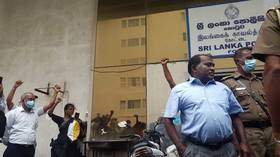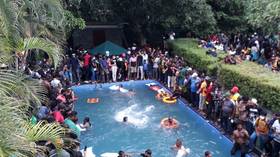Joseph Stalin arrested

Sri Lanka’s authorities on Wednesday arrested one Joseph Stalin. Not the erstwhile Georgian-generalissmo, but the head of the island’s Teachers’ Union.
It came in the aftermath of large-scale protests, last month, which forced the nation’s president Gotabaya Rajapaksa to flee the country and resign.
Police told reporters that the namesake of the Soviet dictator had been arrested “for holding a demonstration in May in violation of a court order.”
In a video, which has been circulating on social media, Stalin, who is considered to be one of the most prominent figures of the protest movement, is heard saying that “the right to protest is a democratic right,” before being taken away by law enforcement officers from his union’s office in Colombo.
Police arrested General Secretary of the Sri Lanka teacher's Union Joseph Stalin #lka#SriLanka#EconomicCrisisLK#SriLankaCrisis#SriLankaProtestspic.twitter.com/IejbjtacoY
— Priyatharshan 🌏 (@priyatharshan1) August 3, 2022
Over the last several months, Sri Lanka has faced protests, largely peaceful initially, over severe food and fuel shortages, blackouts and record inflation. The crisis has been blamed on the Covid-19 pandemic, which cut tourist revenue for the island, and on Rajapaksa’s ban on chemical fertilizers, which was a major blow to the agricultural sector.
The unrest culminated in the storming of the Presidential palace on July 9, which prompted the military to whisk then-President Rajapaksa away to safety. Amid mass unrest, both Rajapaksa and then-Prime Minister Ranil Wickremesinghe announced their intention to resign.
The palace was occupied for approximately ten days, with dozens of videos and photos showing the protesters enjoying the luxuries of the mansion and its vast grounds, including swimming in a presidential pool and bouncing on its beds.
On July 13, Rajapaksa fled to Maldives and then to Singapore. The next day he sent a resignation letter to the speaker of the Sri Lankan government. Less than a week later the Sri Lankan parliament chose six-time prime minister Ranil Wickremesinghe as the island nation’s new president.
The crackdown on “fascist” elements in the largely peaceful protest movement, announced by Wickremesinghe on the first day of his presidency, has seen scores of activists charged with damage to public property.
One of the protesters was accused of raiding Rajapaksa’s liquor cabinet, downing a beer before fleeing with a presidential mug. Another protester, a trade union activist from the Colombo port, was arrested for stealing two official flags from the palace and using them as a bedsheet and a sarong. Both activists reportedly gave themselves away by posting videos and photos of themselves on social media.
Sri Lanka’s new president, who earlier claimed that “time of division is over,” has already become subject of both national and international criticism due to his handling of the protests.
On Tuesday, New York-based Human Rights Watch said that Sri Lanka’s military has sought to crack down on “peaceful dissent” through intimidation, surveillance, and arbitrary arrests of demonstrators, activists, lawyers and journalists since Wickremesinghe’s election.
As an example of such actions, the organization cited the security forces’ raid of an anti-government protest camp outside the presidential office in Colombo on July 22. According to police, the raid led to nine arrests, two of those detained were injured. The organizers of the protest claimed that dozens of people were injured, including several journalists.













